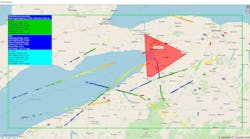U.S. Customs and Border Protection improves business operations with SAP
SAP Public Services announced that personnel at the U.S. Customs and Border Protection (CBP) implemented SAP’s public sector software, consolidating 10 legacy systems with a single solution. Designed to increase process transparency and enhance efficiency for governments, the SAP for Public Sector industry solution set will enable CBP to leverage integrated tools for financial management, business intelligence, asset accounting, real estate, and materials management. The integrated SAP solution will also help the agency reduce IT complexity and maintenance costs, SAP officials say. The benefits of the new SAP system include complete integration, improved financial statements, reduced cycle time, and analytical reporting. For more information on SAP for Public Sector go online at www.sap.com/publicsector.
ImageWare Systems receives order for New Jersey State Police booking system expansion
SAGEM Morpho Inc. (SMI) selected ImageWare Systems in San Diego for the New Jersey State Police (NJSP) booking system expansion project announced in September 2004. With this order, SMI will expand its deployment of integrated Livescan/Mug Shot systems across the department’s multiple precincts. The integrated system, which combines ImageWare’s image-capture technology with SMI’s Livescan software, will enable NJSP to capture a variety of images including digital mug shots, scars, marks and tattoos, as well as fingerprints from a single booking station, eliminating the need for multiple capture stations and redundant data entry. Year to date, ImageWare has received purchase orders for the NJSP project valued in excess of $300,000. For more information visit www.iwsinc.com.
TSA to seek competitive bids for screening equipment maintenance
Officials at the Transportation Security Administration (TSA) will take competitive bids for its Integrated Logistics Support contract to maintain maintenance for most of the screening equipment including metal detectors, x-ray machines, and explosives trace detectors (ETDs) at the nation’s 450 commercial airports. In October, TSA learned of a similar program in another organizational element of the Department of Homeland Security. The contract will be awarded in February. TSA evaluated the existing contract vehicle to determine if the synergies between TSA and the existing program were more beneficial than continuing with a new procurement. Last week, a joint panel of DHS and TSA contracting, legal, and technical officials recommended that while the alternative option has merit, a competitive bidding contracting process would provide the best value to the federal government. TSA will solicit Requests for Proposals (RFPs) from companies that have already submitted white papers to TSA for this contract. TSA has reviewed all the white papers and most qualified respondents will receive the RFP. TSA has extended the current deployment and installation contract for checked-baggage screening equipment with the Boeing Co. through March 10, 2005.
DHS announces more than $2.5 billion in grants nationwide
Secretary of Homeland Security Tom Ridge announced the recipients of $1.66 billion in grants to states and an additional $855 million in grants to urban areas to fund first responders and support state and local resources necessary to prevent, respond, and recover from acts of terrorism and other disasters. Totaling more than $2.5 billion in direct assistance to state and local governments for their preparedness and planning needs, these funds augment the nearly $9 billion already delivered to state and local governments and first responders since the creation of the Department of Homeland Security. Under the state Homeland Security Grant Program, each state, territory and the District of Columbia receives a portion of the $1.66 billion in grants based on a formula consisting of a baseline amount plus the population of the state or territory. The funding is used for equipment, training, planning and exercises. The Urban Area Security Initiative (UASI) provides additional resources to those areas with greater security needs by allocating $855 million in a formula that considers a number of factors including population and population density; critical infrastructure; threat information; formal mutual aid cooperation; and law enforcement investigations and enforcement activity. The recipients of this round of fiscal year 2005 Homeland Security grants will benefit from new measures adopted following recommendations from a task force convened by Secretary Ridge to expedite the flow of funds. State and local governments may now have up to 120 days to draw down funds in advance of purchase and investments, as compared to the three to five days allowed previously, so that even small localities have the buying power to purchase expensive or back-ordered equipment.
L-3 Communications chooses Labarge for airport security equipment
L-3 Communications Security and Detection Systems selected LaBarge Inc. to continue to perform turnkey manufacturing services for L-3’s VIS108, VDS108 and MVT (multiview tomography) explosives-detection systems that use x-rays to detect the presence of explosives or other contraband. LaBarge manufactures and integrates box-level assemblies into higher-level electronic equipment for the inspection systems. VIS108, VDS108, and MVT inspection systems are currently used at international airports to automatically scan checked baggage for the presence of explosives. The majority of the work will be performed at LaBarge’s Huntsville, Ark., facility, with support from its facility in Tulsa, Okla. The company anticipates production to continue through the end of 2006. For more information about L-3 Security and Detection Systems visit www.L-3com.com/xray. For more on LaBarge go online at www.labarge.com.


